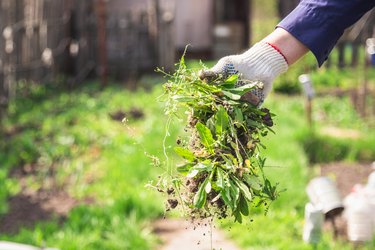
A successful lawn starts with effective weed eradication. When it comes to getting weeds under control, there are both chemical and nontoxic methods that work effectively. Lawn grass grows in U.S. Department of Agriculture plant hardiness zones 1 through 11 depending on the species and variety. Whether you plant new grass seed or lay down sod, taking the time to properly remove the weeds before installing the lawn will pay off when you don't have to spend all summer and fall on your hands and knees ejecting these uninvited guests.
The Smother Method: Fall
Video of the Day
Kill weeds before fall seeding the lawn naturally by smothering them with newspaper and compost in the fall. Leave it in place through the winter, and by spring the weeds will be dead.
Video of the Day
Things You'll Need
Newspaper
Mulch
Tiller
Step 1: Spread the Newspapers
Spread thick layers -- at least five to six sheets deep -- of newspaper over the area you intend to turn into a lawn. Use standard black and white newsprint and skip any of the glossy adds and inserts.
Step 2: Add the Mulch Layer
Top the newspaper with 3 inches of heavy organic mulch like compost or seasoned manure.
Step 3: Till the Newspaper and the Mulch
In the spring, till the newspaper and mulch, along with dead weeds and roots, into the soil with a rototiller.
The Smother Method: Spring
Use the summer sun, and resulting heat, to kill weeds before planting grass seed or laying sod in the area. Start in late spring or early summer and leave the plastic in place for four to six weeks. If it's overcast, or if you live in a cool climate, leave the plastic down for eight weeks to make sure the soil gets hot enough. By late summer or fall, the area will be ready to plant.
Things You'll Need
Mower
Rake
Clear plastic sheeting
Bricks, stones or boards
Step 1: Mow the Area
Mow the weeds, grasses and unwanted plant material as close to the soil as possible. Then rake up and discard the clippings.
Step 2: Till and Rake
Till the soil 6 to 8 inches deep, then rake it smooth.
Step 3: Irrigate the Area
Water the area slowly, until the soil is damp to a depth of 12 inches. A sprinkler works well for this job.
Step 4: Lay Out the Plastic Sheeting
Lay the plastic over the area. Overlap multiple pieces by 5 to 6 inches so that weeds don't sneak through the cracks. Put bricks, stones or boards around the edges to hold the plastic firmly in place.
Step 5: Remove the Plastic
Remove the plastic in the fall, and till the soil again before planting.
The Chemical Control Method
A one-time application of weed killer effectively kills weeds in preparation for a new lawn. Look for a nonselective type weed killer that contains glyphosate. Such products kill weeds on contact, but once they go into the soil, they are no longer active, so you can kill weeds without potentially killing off your future lawn.
Warning
Keep pets and children out of the area until it dries. Wear eye protection and protective clothing. Wash off any herbicide that gets on your skin right away with soap and water. Once finished, throw away the container. Never reuse herbicide containers for any reason.
Use a ready-to-spray product. These typically come with a hose and sprayer included. Wait until a calm, windless day when the air temperature is above 60 degrees Fahrenheit. Spray weeds when they are actively growing until they are saturated. Once the weeds start showing signs of decline, you can pull them by hand and discard them. Weeds will typically die within one to two weeks. You can plant new lawn grass as soon as three days after spraying, as long as the existing weeds are removed by then. One gallon of herbicide typically covers about 300 feet.
The Dig and Discard Method
Manual weed removal is an alternative and nontoxic way to clear weeds before planting a new lawn. And you can plant the lawn as soon as the area is cleared.